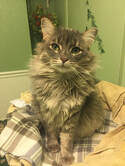 I was having an email exchange with a client about her kitty recently. Her kitty has has some recurrent issues, and all of the current research points toward recurrent problems in cats being secondary to stress. The problem is… my client wasn’t “seeing signs of stress” in her cat. Which brings up the question — what does a stressed cat look like? The answer — a cat. The problem is that as both predators and prey, with an extreme dependency upon maintaining their territory, cats are incredibly adept at looking normal. The only signs that most of us see when our cats are stressed are typically things like changes in play behavior, changes in resting spots, becoming a “picky eater,” or inappropriate elimination. Eventually the physiologic changes associated with chronic stress in a cat become vomiting and diarrhea (inflammatory bowel disease), hair loss from overgrooming (psychogenic alopecia), aggression (directed at other cats or any member of the household), recurrent upper respiratory infections (usually due to herpes), and recurrent urinary tract infections. What we forget about our feline companions is that, unlike dogs who have been selectively bred for generations to tolerate close confinement with people, most of our cats have only been bred to be small. Admittedly, the purebreds (the historically older breeds) seem to tolerate civilization somewhat better than our standard mixed breed kitties, but even many of them suffer from stress-related diseases. All of this leads to the question — What do you do about a stressed cat? The ultimate answer would be “add potted plants to the indoor landscape and set mice loose indoors.” This plan carries the unfortunate drawback of resulting in the deposition of mouse waste in unhygienic locations, as well as the occasional distribution of mouse parts throughout the house. A more acceptable answer is to create opportunities to do cat things, like hunting, in directed ways that are acceptable in a human household. For a cat who is a novice indoor hunter, this means distributing small portions of food in multiple locations throughout the house (or one room, if there is a dog). For the more experienced cat, the bowls can be food puzzles. (Google “No Bowl Feeding System” to see videos of one clever example.) The creation of a more cat-friendly territory can be achieved by strategic placement of scratching substrates as well as cat trees (the taller, the better). Adding resting spots where the cat is in an elevated position and feels concealed (but can easily peek from it and spy) is great. And, of course, the strategic use of Feliway as a diffuser, spray or collar can be immensely helpful to cats who are showing signs of stress (but only in conjunction with the strategies outlined above). If you live with a member of Felis catus, I encourage you to explore one or more of the following resources (in no particular order): The Trainable Cat by John Bradshaw Think Like A Cat by Pam-Johnson-Bennett Does My Cat Hate Me by Amy Shojai Beyond Squeaky Toys by Nicole Nicasio-Hiskey and Cinthia Alia Mitchell Total Cat Mojo by Jackson Galaxy Catify to Satisfy by Jackson Galaxy Catification by Jackson Galaxy Cat Mastery by Dr. Tony Buffington (free ebook available at the website below) The Ohio State University Indoor Pet Project (plug it into the Google machine, the web address is longer than the description) (BTW, my client diligently and enthusiastically embraced de-stressing her cat after our exchange, and the medical issues have improved dramatically.)
0 Comments
|
AuthorsDr. Brenda Mills and staff members Archives
January 2021
Categories |
 RSS Feed
RSS Feed